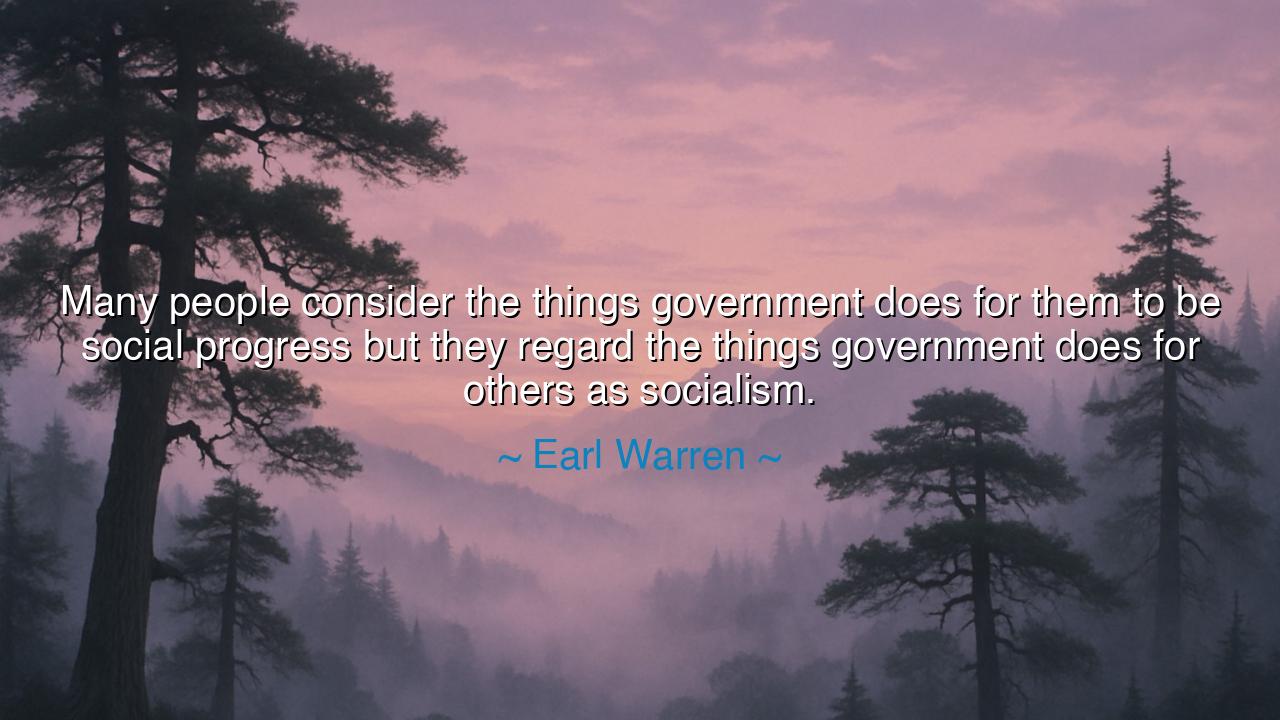
Many people consider the things government does for them to be
Many people consider the things government does for them to be social progress but they regard the things government does for others as socialism.






The words of Earl Warren — “Many people consider the things government does for them to be social progress but they regard the things government does for others as socialism.” — rise like a mirror before the soul of a nation, revealing both its wisdom and its hypocrisy. In this single, piercing observation, Warren, the great jurist and Chief Justice of the United States Supreme Court, exposes the double standard of human self-interest that often hides beneath the language of politics. His words are not merely a critique of government; they are a moral reflection on the heart of society — a reminder that justice, to be true, must be universal, not convenient.
Earl Warren spoke from deep experience. As Chief Justice during the mid-twentieth century — a time of tremendous social transformation — he presided over decisions that reshaped the American conscience. He guided the Court through the era of civil rights, championing equality before the law in cases such as Brown v. Board of Education, which struck down segregation in public schools. But Warren understood that laws alone could not heal a nation divided by self-interest and suspicion. He saw that while people welcomed government aid when it served their needs — in pensions, roads, defense, or schools — they often cried “socialism” when those same benefits were extended to others whose faces, incomes, or histories differed from their own. Thus, his words were both a warning and a lesson: that true progress requires empathy, and that fairness must extend beyond the boundaries of one’s own comfort.
The meaning of his quote rests upon a timeless truth — that man’s nature is prone to selective justice. When the hand of government builds a bridge one must cross, it is hailed as wise stewardship; but when it builds a bridge for another, it is condemned as wasteful interference. This is the blindness of self-centered virtue — the failure to see that the blessings one enjoys were themselves once the fruits of collective effort. In this, Warren speaks like the philosophers of old, reminding us that no society can endure if its citizens demand rights without acknowledging responsibility, or call privilege progress only when it touches their own door.
History offers a vivid mirror to this truth. In the aftermath of the Great Depression, President Franklin D. Roosevelt’s New Deal sought to restore the American economy through public works, social welfare, and labor protections. Millions hailed these reforms as salvation, yet just as many decried them as creeping socialism — especially when they seemed to benefit others more than themselves. The farmer welcomed subsidies, but resented urban housing programs. The industrial worker embraced Social Security, but opposed aid to the unemployed. Thus, even as America rebuilt itself, it wrestled with the paradox Warren would later describe: that people embrace government compassion as virtue when they are its recipients, but condemn it as vice when others receive its grace.
This contradiction, though modern in form, is ancient in spirit. The Romans once scorned public grain rations for the poor, even as their elites enjoyed state-funded feasts. In every age, the struggle between self-interest and collective good has tested the moral fiber of nations. Warren’s insight, like that of the old philosophers, urges us to recognize that a nation’s greatness is measured not by what it does for the powerful, but by what it dares to do for the powerless. A society that exalts progress for “me” but condemns help for “thee” builds not community, but division.
And yet, Warren’s words are not cynical — they are hopeful and corrective. He does not scorn the desire for progress; he calls us to expand it. He invites us to widen our circle of concern, to see our neighbor’s welfare as bound to our own. For in truth, the progress of one cannot endure without the progress of all. When a government uplifts the poor, educates the young, heals the sick, and shelters the vulnerable, it strengthens the foundation upon which even the privileged stand. The wise citizen understands this and sees in every act of public good not socialism, but solidarity — the recognition that we are all part of one human covenant.
So let this be the teaching drawn from Earl Warren’s wisdom: beware of the hypocrisy that calls fairness selfishness when others receive it. The just society is not one where everyone gets what they want, but where everyone gets what they need to live with dignity and purpose. Rejoice not only when the government builds a road to your home, but when it builds a road to another’s — for every bridge of compassion strengthens the whole. Practice gratitude instead of envy, and extend to others the same understanding you demand for yourself.
And thus, remember this truth, O listener: social progress is not the privilege of the few, but the responsibility of all. The hand that helps another lifts the entire nation. When you see your government act with mercy, do not ask, “Why not me?” — ask instead, “Why not all of us?” For only when generosity replaces jealousy, and justice replaces fear, will a people be truly free.






AAdministratorAdministrator
Welcome, honored guests. Please leave a comment, we will respond soon